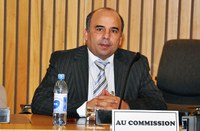 Chaibi's interest in water – both personal and professional – is not surprising. Tunisia receives just 230 millimetres of rainfall each year. That makes it one of the most arid countries in the Mediterranean basin, a region that is not known for abundant water supplies.
Chaibi's interest in water – both personal and professional – is not surprising. Tunisia receives just 230 millimetres of rainfall each year. That makes it one of the most arid countries in the Mediterranean basin, a region that is not known for abundant water supplies.
In seeking to address this issue, Chaibi, who is currently at the Department of Human Resources, Science & Technology of the African Union in Addis Ababa, Ethiopia, has become a pioneer in the utilization of renewable energy sources, most notably solar energy, to generate sufficient supplies of water for agriculture.
"My career has in part been driven by the water shortages that I experienced in my youth," he says. "This was especially true when I was student, earning an engineering degree in hydraulic and rural engineering at the National Institute of Agronomy in Tunis, and then a doctorate degree in agriculture engineering and climate technologies at the Swedish University of Agricultural Sciences in Alnarp."
Tunisia's population is rapidly growing and the water supplies are insufficient to meet the growing demand. "Farmers irrigate their fields with recycled urban and agricultural wastewater," Chaibi notes. "At times, they even draw on groundwater supplies with heavy concentrations of dissolved salts", he adds. Using such unsavoury sources of water not only reduces crop yields, but also pollutes the environment and endangers public health.
In the early 1990s, as the scientific coordinator of the first Tunisian experimental solar desalination plant, Chaibi gained valuable experience on how to improve access to safe water in arid regions.
At the same time, he also succeeded in building a prototype device for heating and moistening air with solar energy and brackish water. The device condenses water vapour that can then be applied directly to plant roots. It has been field tested in Chott Meriam, a small town located on the Gulf of Hammamet in northeastern Tunisia (photo above).
Another of Chaibi's prototypes is a greenhouse-like desalination plant that relies on solar radiation to turn saltwater into freshwater. The plant's solar-panelled roof is where the heat exchange takes place. Salt is extracted from the seawater and deposited on the eaves of the roof and then easily collected (photo below).
This prototype, Chaibi says, has been successfully tested in remote regions of Tunisia as part of a pilot programme established by the Tunis-based National Institute for Research on Rural Engineering, Water and Forestry (INRGREF).
Chaibi hopes that his greenhouse desalination plant can one day be integrated into the water systems of Tunisia and elsewhere in Africa – and eventually in other arid regions throughout the world. However, in the near term, he and his colleagues, who as engineers fully understand the need to be practical, are scaling up the plant and seeking ways to market the design in the Mediterranean basin.

